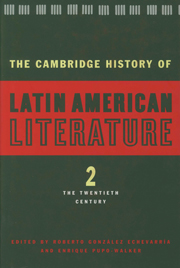Book contents
- Frontmatter
- Introduction to Volume 2
- 1 Modernist poetry
- 2 Modernist prose
- 3 The Vanguardia and its implications
- 4 The literature of Indigenismo
- 5 Afro-Hispanic American literature
- 6 The Criollista novel
- 7 The novel of the Mexican Revolution
- 8 The Spanish American novel from 1950 to 1975
- 9 The Spanish American novel: recent developments, 1975 to 1990
- 10 Spanish American poetry from 1922 to 1975
- 11 The modern essay in Spanish America
- 12 Literary criticism in Spanish America
- 13 The autobiographical narrative
- 14 The twentieth-century short story in Spanish America
- 15 Spanish American theatre in the twentieth century
- 16 Latin American (Hispanic Caribbean) literature written in the United States
- 17 Chicano literature
- Index
- Bibliographies
- References
5 - Afro-Hispanic American literature
Published online by Cambridge University Press: 28 March 2008
- Frontmatter
- Introduction to Volume 2
- 1 Modernist poetry
- 2 Modernist prose
- 3 The Vanguardia and its implications
- 4 The literature of Indigenismo
- 5 Afro-Hispanic American literature
- 6 The Criollista novel
- 7 The novel of the Mexican Revolution
- 8 The Spanish American novel from 1950 to 1975
- 9 The Spanish American novel: recent developments, 1975 to 1990
- 10 Spanish American poetry from 1922 to 1975
- 11 The modern essay in Spanish America
- 12 Literary criticism in Spanish America
- 13 The autobiographical narrative
- 14 The twentieth-century short story in Spanish America
- 15 Spanish American theatre in the twentieth century
- 16 Latin American (Hispanic Caribbean) literature written in the United States
- 17 Chicano literature
- Index
- Bibliographies
- References
Summary
That the 1970s should have been the decade to inaugurate the field of Afro-Hispanic (American) studies is scarcely surprising: the Civil Rights and Black Power movements in the United States had prepared the ground for the founding of numerous Afro-American studies programs while the Boom of the Latin American novel - sponsored largely by the United States’ aggressive investment in Latin American culture aimed at defusing the political threat of a post-revolutionary Cuba - continued to draw international attention to Latin America’s literary production. This, in turn, provided publishing outlets and markets for many poets and novelists of African descent, whose work received special attention and support from newly founded organizations, such as the Afro-Ecuadorian Studies Center in Quito (1979), the Center for the Study of Black Culture in Bogotá (1977), and the Afro-Hispanic Institute at Howard University in Washington, D.C. (1981). Like their predecessors, the Institute for Afro-American Studies in Mexico (1945) and the Society for Afro-Cuban Studies Against Racism in Cuba (1936), these and other institutes also launched new journals: Cuadernos Afro-Americanos (Caracas, 1975), Negritud (Bogotá, 1977), Studies in Afro-Hispanic Literature (Purchase, New York, 1977), and the Afro-Hispanic Review (Washington, D.C, 1982, now located in Columbia, Missouri). Conferences were organized, most notably the Colloque Négritude et Amérique Latine (University of Dakar, Senegal, 1974), the Primer Congreso del Negro Panameño (1981), and several Congresos de la Cultura Negra de las Américas (Colombia, 1977; Panama, 1980; Brazil, 1982).
A number of publishing houses, among them Casa de las Américas, Ediciones Universal, and Casa de la Cultura Ecuatoriana, started to reprint “classic” twentieth-century Afro-Hispanic texts, such as Adalberto Ortiz’s Juyungo (1968); Arnoldo Palacios’s Las estrellas son negras (1971); Juan Pablo Sojo’s Nochebuena negra (1972); Sofía (1972) and La familia Unzúazu (1975) by Martín Morúa Delgado (1856-1910); Autobiografía de un esclavo (1975) by Juan Francisco Manzano; Nicolás Guillén’s Motivos de son (1980); Marcelino Arozarena’s Canción negra sin color (1983); Regino Pedrozo’s Poesías (1984); and the complete works of Alejo Carpentier, the first volume of which includes all of his “Afro-Cuban” texts.
- Type
- Chapter
- Information
- The Cambridge History of Latin American Literature , pp. 164 - 194Publisher: Cambridge University PressPrint publication year: 1996
References
- 2
- Cited by

